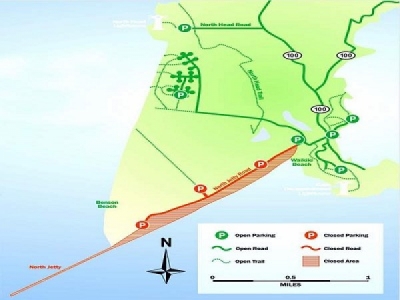
Posted on January 31, 2018
By Natalie St. John, Chinook Observer
The U.S. Army Corps of Engineers next month will begin a long-planned effort to rehabilitate the North Jetty at Cape Disappointment State Park. Nearby Benson and Waikiki beaches will remain open during construction. However, the jetty, North Jetty Road and some nearby parking lots will be closed for much of 2018 and 2019, according to a Jan. 25 press release.
Nine miles of jetties, nine years of repairs
The upcoming repairs are the second phase of the Army Corps’ ambitious effort to overhaul the three aging jetties at the mouth of the Columbia River. The Corps completed two years of work on the mile-long “A” Jetty in 2017, at a cost of about $30 million, according to the Corps’ 2012 “Major Rehabilitation Evaluation Report.”
Starting on Feb. 12, the Corps will turn its attention to the 2.5-mile-long, 100-year-old North Jetty. The work is expected to continue through to Oct. 30 this year, and resume from March 17 to Nov. 1, 2019. Workers will shore up weakened and damaged parts of the jetty, and fill in a lagoon that is eroding the base of the jetty. The project will cost an estimated $80 million.
During the third phase, slated to take place between 2019 and 2023, the Corps will rehabilitate the six-mile-long South Jetty at an estimated cost of at least $147 million.
$20 billion in trade at stake
The three “rubble-mound” jetties were built on large sand shoals between 1885 and 1939 to make it easier for vessels to pass between the Columbia River and the Pacific Ocean. Before the jetties were built, crossing the notorious, constantly-changing Columbia Bar was so treacherous that ships sometimes waited a month or more for favorable conditions.
“At best, crossing the bar was dangerous. At worst, it was not possible,” Corps officials wrote in their 2,566-page report.
To this day, the jetties play a critical role in the economies of Oregon and Washington, and in the “Columbia River plume” — the stream of nutrients and sediments that flow into the ocean, providing a key source of food for some endangered salmon species.
According to Army Corps figures, the jetties facilitate about $20 billion in international trade, about 3,500 cargo vessel crossings and the transportation of around 42 million tons of cargo each year, and also support an estimated
Keeping the Columbia River shipping route open requires constant effort, especially at the mouth of the river, where tidal and climate conditions are frequently severe. The Corps has made numerous costly repairs to damage caused by the large waves that routinely batter the jetties. Most recently, the Corps made “critical repairs” to South Jetty in 2007 and North Jetty in 2015. Despite these efforts, the ocean has continued to eat away the jetties’ foundations, and reconfigure the contours of both the deep-draft shipping channel and the nearby beaches. That damage threatens both commerce, and the safety of vessels that use the navigation channel. In recent years, the deterioration has accelerated, increasing the risk that one of the jetties will fail, Corps officials say.
According to the project web page, “If a critical section of the jetties were breached during a large storm, sand could be deposited into the federal navigation channel potentially shutting down commercial shipping. That would bring shipping to a halt while the Corps made expensive emergency repairs and dredged the channel to make it passable again.
Less parking, more information
Members of the public will still be able to use the popular beaches on either side of the jetty, but parking will be tricky. While the Waikiki Beach parking lot while be open at times, depending on the level of construction traffic in the area, the parking areas closer to Benson Beach and the North Jetty will be closed the entire time.
North Jetty is a popular sports fishing site. Some local fishermen have expressed concern about the long lack of access. The Corps has noted the structure was never intended as a recreational asset.
For more information, visit www.nwp.usace.army.mil/jetties.





